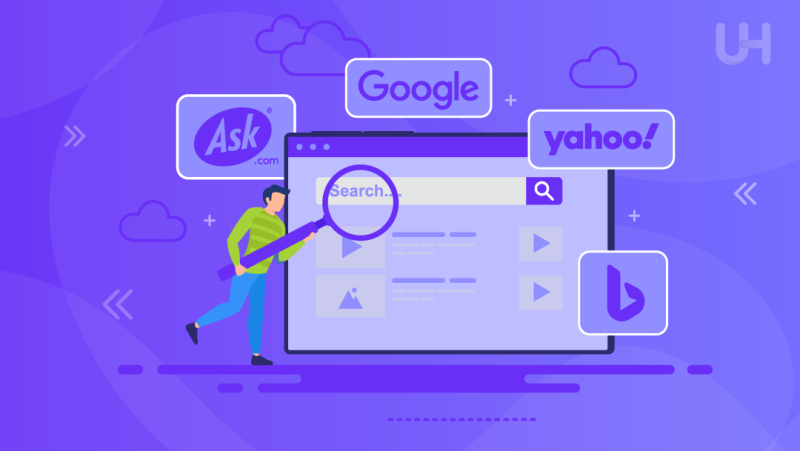Did you know there’s more to searching online than just Googling? While Google dominates the market, a whole world of other search engines exists, each with its own unique features.
These tools are not just about finding websites. They use special programs to crawl and sort information from all over the internet. This process helps them provide you with the most relevant results for your search query.
Some search engines, like DuckDuckGo, prioritize your privacy and don’t track your data. Others, such as Ecosia, focus on environmental good by using their revenue to plant trees around the world.
From Russia’s Yandex to China’s Baidu, these engines reflect diverse user needs and regional preferences. The variety of options shows that the digital landscape is much richer and more varied than it first appears.
Key Takeaways
- Google’s Dominance: Google is the most popular search engine, but it was originally a small project started by two students.
- More than just Google: Many other search engines exist, and they often have a special purpose.
- Privacy Matters: Some search engines, like DuckDuckGo and Qwant, focus on protecting your privacy by not tracking your searches.
- Search for Good: Others, like Ecosia, use the money they make to plant trees, while Dogpile supports animal welfare.
- Regional Differences: Popularity of search engines can change by country, like Baidu in China and Yandex in Russia.
- SEO’s Importance: For websites, something called SEO (Search Engine Optimization) is very important for helping them show up higher in search results.
What is a search engine? How does it work?
A search engine helps you find information on the Internet. You type words into a search box. Then, it gives you many websites that match your words. Search engines work using special programs. These programs check many websites to find the best results for you. Some programs visit websites and collect information. Other programs sort this information and decide how important it is. The final component is the search engine interface. It is the user-facing part that displays the search results.
Search engines are important for online marketing. Websites use SEO (Search Engine Optimization). SEO helps websites appear higher in search results. If you have a website, good SEO and using SEO-friendly hosting helps your website become easier to find online. The first step will be to place your website on an SEO-Friendly VPS Hosting.
Ranking of Search Engine Popularity
1. Google
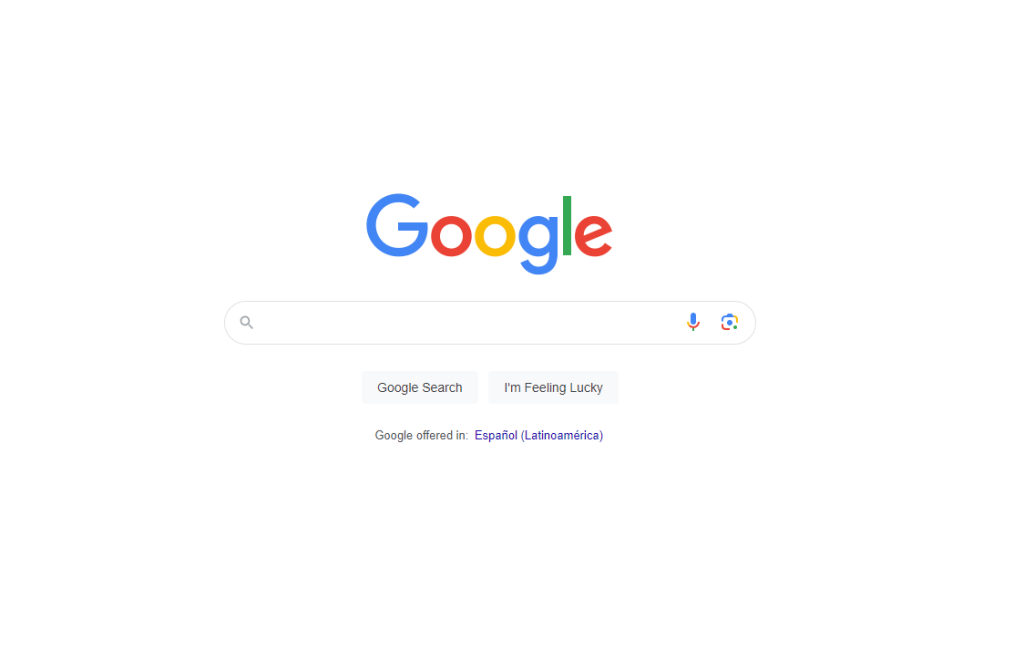
Google is the most popular search engine in the world. 92% of people online use Google. It started in 1996 when two students, Larry Page and Sergey Brin, made a new way to find websites. Their idea was called PageRank. In 1998, they created Google.com. By 2004, Google was already the biggest search engine.
Google has many extra tools. You can search for pictures, maps, videos, or use voice search. Google also gives you Gmail, YouTube, Chrome browser, Google Maps, Google Ads, and many other tools.
Key Features
- Dominant Market Share: The most widely used search engine globally.
- Comprehensive Suite: Integrates with a vast ecosystem of products like Gmail, YouTube, and Maps.
- Advanced Search Capabilities: Offers specialized searches for images, videos, news, and academic papers.
Pros
- It has the most extensive database and provides a wide range of relevant results.
- The personalized search experience is highly tailored to your history and preferences.
- The integrated services and tools are very convenient for a unified online experience.
Cons
- It has a known history of collecting user data for targeted advertising.
- Its search results can sometimes be cluttered with advertisements and sponsored content.
2. Bing
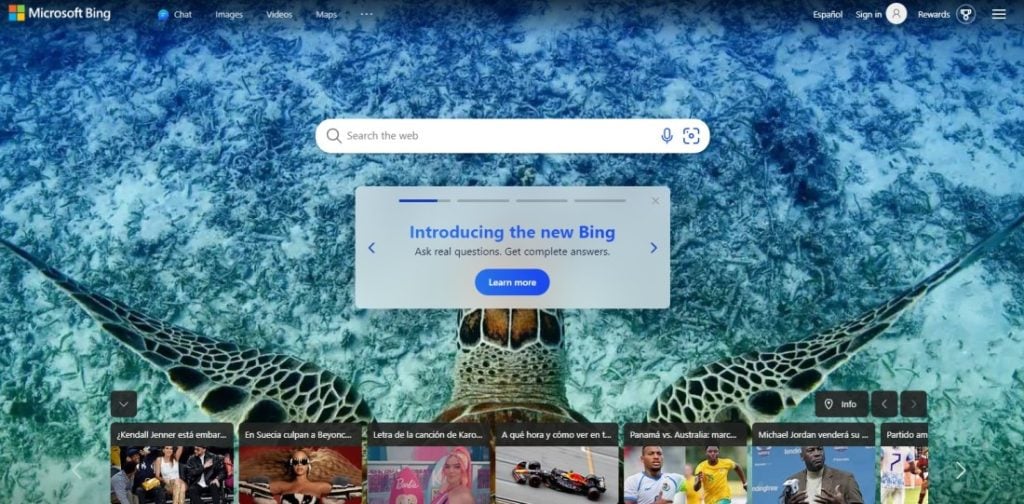
Bing is owned by Microsoft. It started in 2009. Bing is used mostly on Windows computers. It is easy to use with the Edge browser. Bing is similar to Google. It also has image, video, and map searches. Bing now uses artificial intelligence (AI), called ChatGPT. AI made Bing more popular.
Key Features
- Microsoft Integration: Seamlessly works with Windows and the Edge browser.
- Visual Search: Known for its high-quality daily homepage images.
- AI Integration: Uses ChatGPT to provide enhanced, conversational results.
Pros
- The visual design and attractive daily homepage images are a nice touch.
- It offers rewards programs that can earn you points for searches.
- Its integration with Microsoft products makes it useful for Windows users.
Cons
- It has a much smaller market share, leading to a less diverse user base.
- Some users find its interface to be less clean and intuitive than its competitors.
3. Yahoo!

Yahoo! was very popular before. It started in 1994. But now fewer people use it. In 2009, 6% used Yahoo!, but now only about 1.5% use it. Yahoo! is popular in Japan (17.4% users). In the United States, it still has over 3% users. Since 2016, Yahoo! is owned by Verizon Media, the same company that owns AOL.
Key Features
- Content-Rich Portal: Provides news, sports, and finance content directly on its homepage.
- Email Service: Integrates a popular email platform.
- Global Presence: Maintains a strong user base in specific regions like Japan.
Pros
- It provides a comprehensive web portal with curated news and content.
- The email service is reliable and includes powerful spam filters.
- It is a stable and user-friendly platform that is easy to navigate.
Cons
- It is known for a slower performance compared to more modern search engines.
- The user interface can feel dated and cluttered with advertisements.
4. Baidu

Google is not popular in China. It was blocked in China in 2010 because of government rules. Baidu is now the biggest search engine in China. Baidu started in 2000. It only works in the Chinese language. Many people in China use it (almost 500 million users). Baidu follows Chinese government rules. This means it blocks results about democracy or human rights.
Key Features
- China’s Leader: The most popular search engine within China.
- Strict Adherence to Regulations: Operates within the Chinese government’s legal and censorship framework.
- Chinese Language Focus: Optimized for Chinese language queries and content.
Pros
- It offers a rich homepage with a focus on local Chinese services and content.
- It is well-suited for businesses and individuals targeting the Chinese market.
- The platform has a quick indexing feature for newly published content.
Cons
- It has a very limited global reach as it focuses on China exclusively.
- Results are heavily censored and do not show certain topics.
5. Yandex

Yandex is an acronym for “Yet Another iNDEXer”. It is popular in Russia (over 47% use it). Yandex has maps, video searches, cloud storage, and translation tools. It is also used in countries like Ukraine, Belarus, Kazakhstan, and Turkey.
Key Features
- Russian Dominance: The leading search engine in Russia.
- Diverse Services: Offers a wide range of services, including maps, music, and cloud storage.
- International Reach: Used in several other countries in Eastern Europe and Central Asia.
Pros
- It is highly optimized for the Russian language, providing excellent local results.
- The suite of integrated services is very comprehensive and convenient.
- Its algorithm is very good at understanding the context of queries.
Cons
- It faces privacy concerns due to government regulations and data collection.
- It is heavily localized, making it less useful for non-Russian speakers.
6. DuckDuckGo
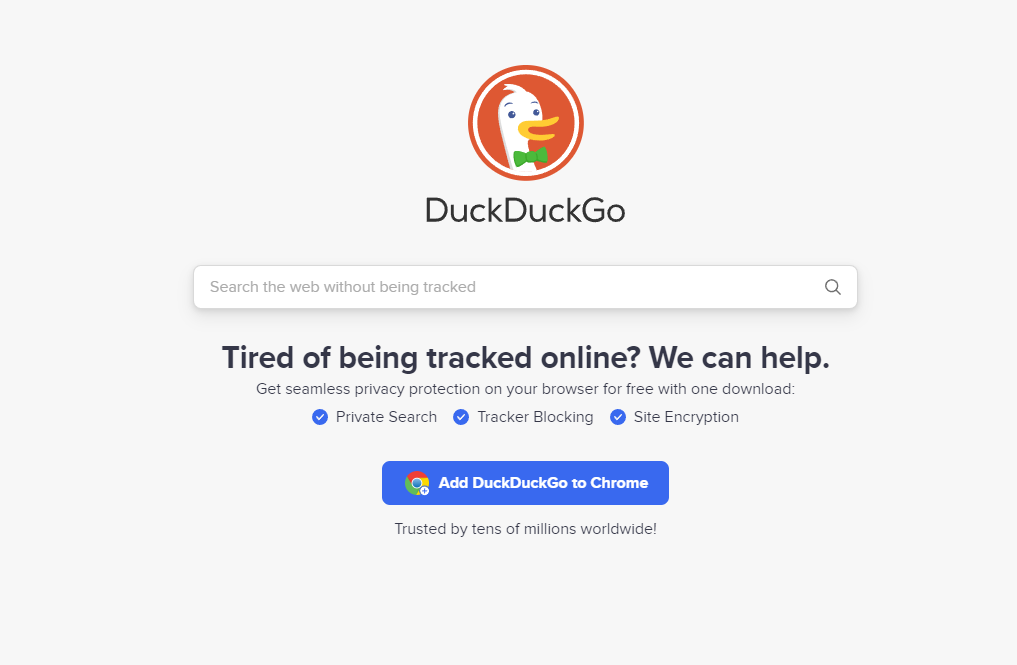
DuckDuckGo cares about your privacy. It does not share your personal data. DuckDuckGo does not track you. It keeps your searches private. It has become more popular because people worry about privacy online. About 2.6% of people in the United States use it.
If you want to prioritize anonymity, you can use a privacy-respecting browser, a VPN to hide your true location, or pay for hosting services with Bitcoin. UltaHost provides you with such an opportunity. You can pay for our hosting with different cryptocurrencies.
Key Features
- Privacy-Focused: Does not track user data or browsing history.
- No Personalized Results: Provides the same results for all users, regardless of location or history.
- !bang Commands: Allows users to search directly on other sites.
Pros
- It ensures your searches are not saved or sold to advertisers.
- The interface is clean, minimalist, and free of personalized ads.
- The !bang commands are a fast way to search specific websites.
Cons
- The lack of personalization can sometimes lead to less relevant results.
- It has a much smaller index and may not find results for very niche topics.
7. Ask.com

Ask.com started in 1996 as “Ask Jeeves”. You could ask questions and get answers from people. Nowadays about 50 million people use it monthly, mostly in the US, UK, and Japan. Unfortunately for many people a big disadvante is a toolbar “Ask Toolbar”. Many people has big problems with removing it. Since 2010, Ask.com uses Google results.
Key Features
- Q&A Format: Originated as a question-and-answer platform.
- Google-Powered Results: Now relies on Google’s search index for most queries.
- Toolbars: Historically associated with an intrusive browser toolbar.
Pros
- It is a good option for people who prefer to formulate their searches as questions.
- The interface is simple and easy to use.
Cons
- It has been criticized for its “Ask Toolbar” that is difficult to remove.
- Search results are often a mix of Q&A forums and web search.
8. AOL Search

AOL started in 1983. It was a big company around the year 2000. AOL bought Time Warner for a lot of money. Later, AOL lost many users and had problems. In 2006, AOL accidentally shared data from 650,000 users. Verizon owns AOL since 2015.
Key Features
- Legacy Brand: Once a dominant internet provider in the early days of the web.
- Verizon Ownership: Now a part of Verizon Media.
- Curated Content: Provides a portal with news, entertainment, and financial information.
Pros
- The interface is straightforward and easy to use for simple searches.
- It offers a curated content experience on the homepage.
- It is part of a larger network of web properties.
Cons
- Its search results are often not as robust as major competitors.
- It is primarily a legacy brand and has a much smaller user base.
9. Qwant

Qwant started in France in 2013. It also cares about user privacy. Qwant uses Bing search results. Many people (around 50 million every month) choose it to stay private online.
Key Features
- European Origin: Started in France with a focus on privacy.
- Privacy First: Does not collect personal data or track search history.
- Bing Partnership: Uses results from Bing’s index.
Pros
- It provides private search results that are not influenced by your data.
- It has a clean user interface.
- It is a good choice for people who want a balance of good results and privacy.
Cons
- It may not be as comprehensive as Google due to its reliance on Bing’s index.
- Its user base is still relatively small.
10. Ecosia

Ecosia is special because it plants trees when you use it. Money from searches helps plant trees. It uses search results from Microsoft (Bing). It takes about 45 searches to plant one tree. Ecosia planted over 120 million trees already. People who care about nature use Ecosia. On their homepage, you can witness the impact of user activity, with over 120 million trees already planted. Ecosia is the perfect choice for people concerned about the high levels of carbon dioxide in our atmosphere.
Key Features
- Environmental Mission: Plants trees with ad revenue.
- Microsoft-Powered: Uses Bing search results.
- Transparent Reporting: Publishes financial reports to show where its money goes.
Pros
- It allows you to contribute to a positive cause with every search.
- It is a great option for people who care about sustainability.
- The platform is transparent about its mission and finances.
Cons
- Its search results are not unique, as it uses another company’s index.
- The amount of revenue dedicated to tree planting can fluctuate.
11. Dogpile
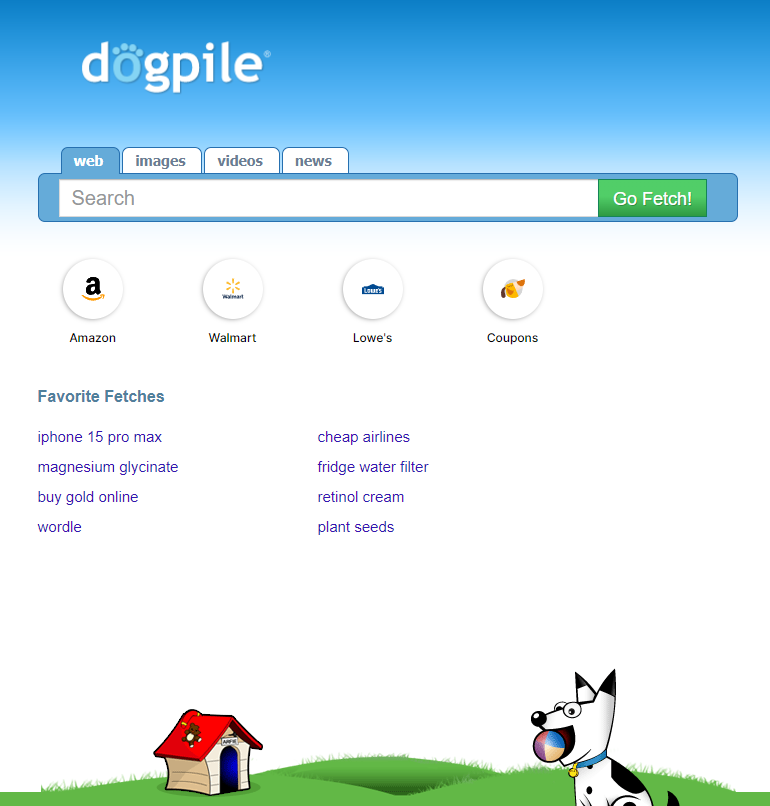
I’ve covered an environmentally conscious search engine, so now let’s talk about a service that supports animals. Dogpile, created by Aaron Flin in 1996, gathers information from Google, Yahoo!, and Bing, and the revenue it generates is directed toward supporting charitable organizations focused on animal welfare.
Key Features
- Metasearch Engine: Gathers results from multiple search engines.
- Animal Welfare: Directs revenue to animal-focused charities.
- Nostalgic Name: Known for its iconic dog mascot.
Pros
- It provides a wide range of results by pulling from multiple sources.
- It supports a good cause with its revenue.
Cons
- The results can sometimes be redundant due to the nature of metasearching.
- The interface and presentation of results can feel outdated.
12. Wolfram Alpha
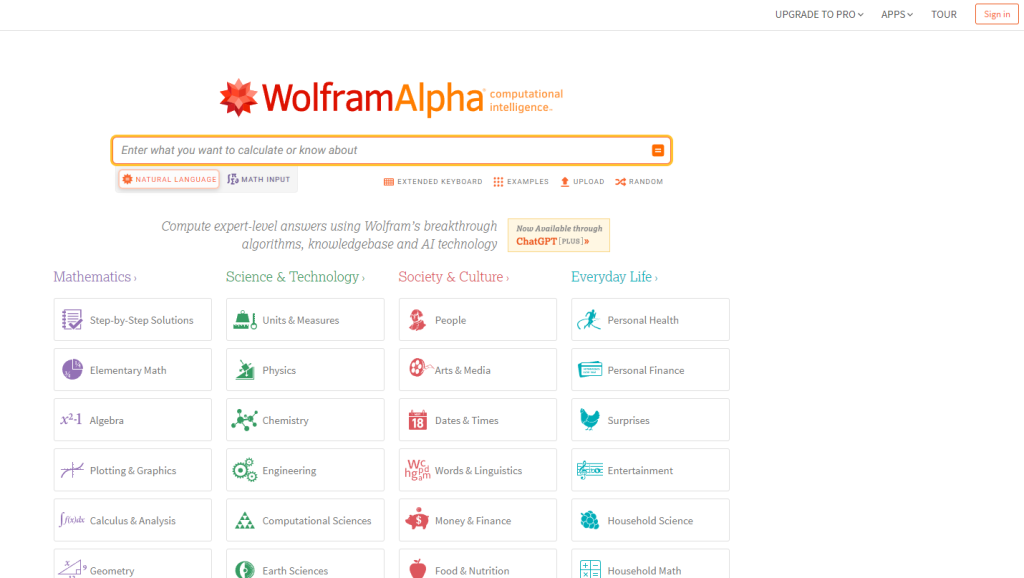
Wolfram Alpha was published in 2009. It is not a typical search engine. It specializes in providing answers to queries formulated in natural language. Additionally, it excels in handling mathematical language, making it a powerful tool for performing calculations and solving complex equations.
Key Features
- Computational Knowledge Engine: Provides direct answers and data, not just links.
- Natural Language Processing: Understands and solves complex queries in plain language.
- Specialized Fields: Excels in math, science, and engineering.
Pros
- It provides precise, factual answers and step-by-step solutions for complex problems.
- It is an excellent tool for students and professionals in technical fields.
- The platform is very accurate for factual and computational queries.
Cons
- It is not a typical search engine and is not useful for general web browsing.
- It struggles with more nuanced or qualitative queries.
Conclusion
The massive triumph of Google in the global search engine market is a highly intricate subject. It owes much of its success to the development of PageRank. Its simplicity in usability and unassuming appearance, coupled with lightning-fast speed, further contributed to its popularity.
Competition also played a role in shaping the landscape. Other search engine providers failed to seize the opportunities and untapped potential of Internet search engines during the late 20th and early 21st centuries. Microsoft’s search engine only gained independence in 2009, while Yahoo!, due to a series of ill-advised decisions, found itself in dire straits that led to the company’s eventual sale.
Our brief overview of the world’s most popular search engines has revealed that despite Google’s dominance, a portion of users gravitates towards alternative solutions that offer enhanced privacy. These alternatives continue to attract new supporters as they strive to meet the evolving needs of users in an ever-changing digital landscape.
If you enjoyed this article, then you’ll love UltaHost Fast WordPress Hosting platform. Get 24/7 support from our support team. Our powered infrastructure focuses on auto-scaling, performance, and security. Let us show you the difference! Check out our plans!
FAQ
Can a domain lose its value over time?
Yes, a domain can lose value if its relevance fades, market trends change, or its SEO metrics decline.
Are shorter domains always more valuable?
Yes, shorter domains are generally more valuable because they are easier to remember, type, and brand.
How often should I check my domain’s value?
You should appraise your domain at least once a year, or whenever you receive a strong offer or notice significant market changes.
Does having an SSL certificate affect a domain’s value?
Yes, an SSL certificate adds security and credibility, making a domain more attractive and potentially increasing its value to buyers.





